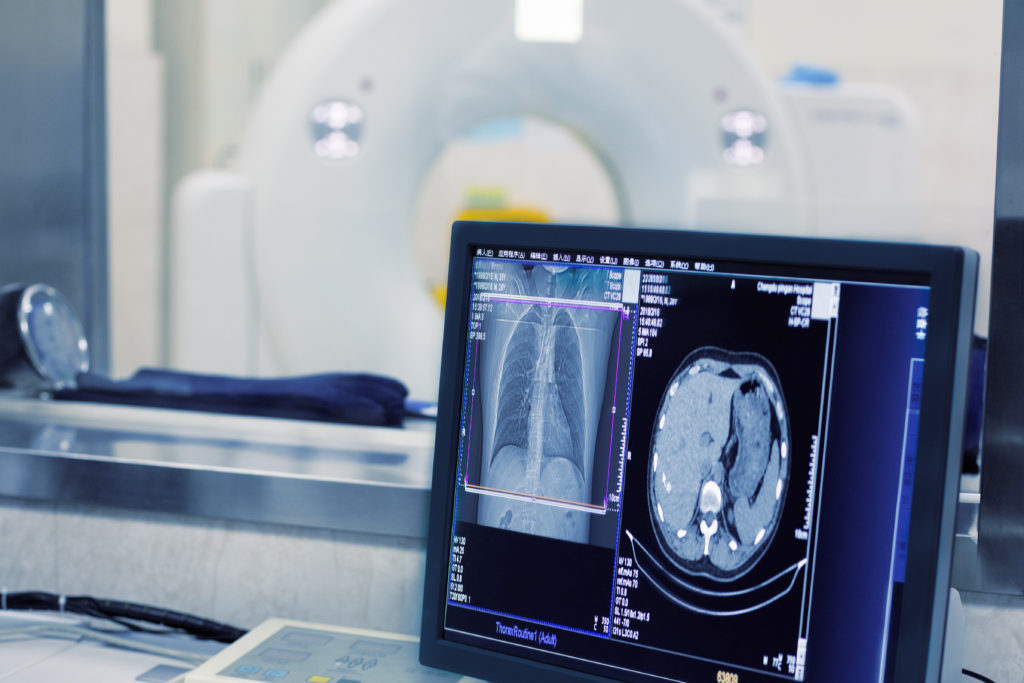When your healthcare provider suggested that you get a chest CT scan, you may have been a little worried, and that’s completely understandable.
Rest assured that a chest CT is a non-invasive study, so it’s ideal for people with certain conditions, and it can give your provider accurate and detailed information about your health.
That’s exactly why a lot of providers recommend a chest CT to their patients.
Let’s dive into the basics of what a chest CT scan is, why it might be recommended, and how it stands out from other imaging studies.
What is a chest CT scan?
A chest CT scan is a sophisticated way to capture detailed images of the structures inside your chest.
Unlike standard photographs, this scan provides a series of cross-sectional images (which look sort of like slices), and offer a comprehensive view of your chest’s interior.
This technology enables your healthcare provider to examine the lungs, heart, and other chest structures with exceptional clarity.
The process is quick and painless, typically completed within minutes, making it a convenient yet powerful diagnostic tool.
Why has my healthcare provider recommended a chest CT scan?
Your healthcare provider may recommend a chest CT scan for a variety of reasons. It’s an invaluable tool for diagnosing conditions, monitoring the progression of existing issues, or even guiding treatment plans.
For instance, if you’ve been experiencing symptoms such as persistent cough, difficulty breathing, or chest pain, a chest CT scan can help uncover the underlying cause, which may be the result of an infection, an injury, or a disease affecting the chest organs.
A chest CT can also track how well your body is responding to treatment for known conditions, providing essential feedback for your healthcare team.
Preparing for your chest CT scan
Before your scan, there are a few things you can do to ensure that you end up with accurate CT results, and that you have a comfortable experience.
For many people, preparing for a CT scan is pretty straightforward, as long as you follow your provider’s orders.
We’ll walk you through the important preparations to help you feel more comfortable and ready for your upcoming scan.
How should I prepare the day before my scan?
Be sure to gather any necessary identification and documents that you might need to bring with you, like your driver’s license and insurance card. That way, you won’t be scrambling on the day of your scan.
Make sure you’re well-rested for the scan. It’s a good idea to plan a quiet evening, the night before, and avoid any strenuous activities that could leave you feeling tired for your scan.
Are there any dietary restrictions I need to follow?
Your dietary restrictions will vary, depending on the specifics of your chest CT scan, especially if a contrast material is involved.
Generally, most people are asked to avoid eating or drinking for a few hours before your scan. This just helps to improve the quality of the images.
Your healthcare provider will give you specific instructions based on your individual needs. It’s important that you follow their instructions very carefully.
Should I continue taking my regular medications?
In most cases, you can continue taking your regular medications as prescribed, but check with your healthcare provider first.
Your provider will review your current medications, and advise you on which ones you should take as usual, or make any adjustments if necessary.
Always tell your healthcare team about all the medications you’re taking, including over-the-counter drugs and supplements, to avoid any potential trouble. If you’re not sure, just tell them.

During your chest CT scan
At an imaging center, you should expect a comfortable and worry-free chest CT.
That’s because you’ll be supported the entire time by a team of healthcare professionals who will provide you with accurate CT results.
Let’s explore what a chest CT scan is like, from the time that you arrive until the time you get your scan.
What will happen when I arrive for my scan?
On arrival, you’ll be greeted and guided through the initial steps, which typically involve a brief review of your medical history and the process ahead.
You will be asked to change into a gown to ensure that no clothing interferes with the scan.
Personal items such as jewelry or other metal objects will need to be removed if they’re in the area being scanned. That’s because metal will interfere with your CT scan.
Your healthcare team will then lead you to the room with the CT scanner, a large machine with a tunnel in the center, and they’ll ask you to lay on a sliding table where your team will make you comfortable for your scan.
How long does a chest CT take?
The actual scanning process is surprisingly quick, often taking only a few minutes to complete. However, the entire appointment may last a bit longer, usually around 20-30 minutes to accommodate for preparation and taking care of you afterward.
The CT scanner works quickly and efficiently to capture highly detailed images of the inside of your chest. Rest assured, your imaging center’s staff is experienced in ensuring that the process is as efficient and as comfortable as possible.
Will I need to hold my breath during the scan?
Yes, you might be asked to hold your breath for a few seconds at a time during the scan. This is to make sure the images captured are as clear as possible.
The technologist will communicate with you throughout the process, letting you know when to hold your breath, and when you can breathe normally.
If you’re concerned about your ability to hold your breath, then you should feel free to discuss this with the technologist, whose responsibility it is to ensure accurate images.
After your chest CT
Once your chest CT scan is complete, you and your healthcare provider will receive your results, and your provider will discuss them with you.
Your CT results are important because they’re detailed images that tell your provider a lot about your current health.
In this section, we’ll explore the steps following your scan, including when to expect results, understanding potential side effects or aftercare requirements, and what happens if your scan indicates an abnormality.
When can I expect to receive the results of my scan?
The time frame for receiving the results of your chest CT scan can vary. Usually, you can expect to hear from your healthcare provider within a few days to a week.
The images captured during your scan are analyzed by a radiologist, which is a doctor specialized in interpreting medical images, who then prepares a report detailing their findings.
This report is sent to your healthcare provider, who will then discuss the results with you, offering insight into what has been found and what it means for your health.
Are there any side effects or aftercare steps I should know about?
The most common side effect is a reaction to the contrast material. If your scan includes a contrast dye to enhance the images, you might experience a slight metallic taste in your mouth, or a warm sensation during the injection.
For most people, these sensations are temporary and typically resolve quickly.
Patients with kidney problems should inform their doctor before the scan since the contrast dye can affect kidney function.
Drinking plenty of fluids after your scan can help flush any remaining contrast material from your body.
Generally, no special aftercare is required, and patients can usually resume their normal activities immediately after the scan.
However, your healthcare provider may give specific instructions based on your individual health situation or the results of the scan. Always consult with your healthcare provider for personalized advice and follow-up care based on the outcomes of your CT scan.
What are the next steps if my scan shows an abnormality?
Discovering an abnormality on your chest CT scan can be concerning, but it’s important to remember that it’s a step toward getting the care you need.
Your healthcare provider will discuss your results with you in detail, including any further tests or treatments that may be necessary. The next steps may include additional imaging tests, consultations with specialists, or discussing treatment options.
The goal of your healthcare team is to provide you with the most accurate diagnosis, and the best possible care plan, tailored to your specific situation.
How to schedule a CT appointment with us
Reach out to us at American Health Imaging, and we’ll help you schedule an appointment at an imaging center near you, today.
We’re here to help you get the answers you need.
Frequently asked questions
What is a chest CT scan?
A chest CT scan is a detailed imaging test that provides cross-sectional images of the chest and lungs.
Why has my healthcare provider recommended a chest CT scan?
Your healthcare provider may recommend a chest CT scan to diagnose, monitor, or rule out various chest and lung conditions.
How does a chest CT scan differ from other imaging tests?
Unlike other imaging tests, a chest CT scan offers detailed views of the chest’s bones, blood vessels, and soft tissues in cross-sections.
What should I do the day before my scan?
The day before your scan, you should follow any pre-test instructions given by your healthcare provider, which may include dietary restrictions or medication adjustments.
Are there any dietary restrictions I need to follow before my chest CT scan?
You may be asked to avoid eating or drinking for a few hours before your chest CT scan, depending on the use of contrast material.
Should I continue taking my regular medications before my chest CT scan?
Continue taking your regular medications unless your healthcare provider instructs otherwise, and inform your scanning team about all medications you’re taking.
When can I expect to receive the results of my chest CT scan?
Results typically become available to your healthcare provider within a few days after the scan, who will then discuss them with you.
What are the next steps if my chest CT scan shows an abnormality?
If your scan shows an abnormality, your healthcare provider will discuss the findings with you and outline the next steps, which may include further testing or treatment plans.
